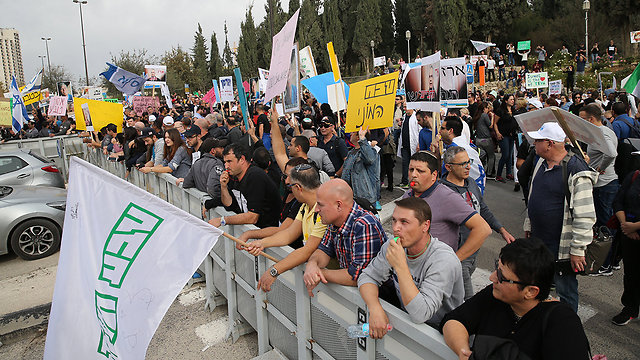
Teva CEO tells PM no bending on mass redundancy plan
Despite personal attempts by Netanyahu and government ministers to persuade pharmaceuticals giant's chief to reduce number of planned layoffs, Kåre Schultz doubles down, insisting any compromise will only result in 'further redundancies and the closure of more factories,' notes program represents a ‘small part’ of cost slashing spree around the world.
The meeting, which took place in Jerusalem against a backdrop of a wave of protests by the company’s workers, concluded without progress in putting a stop to the planned layoffs that will see a reduction of 25 percent of the company’s workforce and a suspension of its dividend on ordinary shares in a much-anticipated overhaul to help pay back its massive debt.
Schultz informed the prime minister that he did not intend to revise the planned number of redundancies that is expected to reach 1,700 workers from the financially straitened company, and that the plan to shut down its factories would proceed.
Schultz, known for his hard-nosed and ruthless approach in implementing cutbacks, refused to give way on any of the suggestions made by Netanyahu.
“This is our plan to cope with the situation which we are in. Any attempt by you to change the plan could cause the company serious damage and cause more layoffs and the closure of more factories,” Schultz warned as he doubled down on his proposal.
With Schultz’s stated determination not to budge, the government will no longer consider providing grants to Teva and is expected to seek other alternatives for the workers.
During the talks, Netanyahu and Schultz also discussed the need to find a solution for employment for the workers. Officials who were present claimed that the heads of Teva also acknowledged the necessity to provide assistance on the the issue.
“We want to save Teva and that means reducing the company’s costs,” Schultz told Netanyahu, Finance Minister Moshe Kahlon, Economics Minister Eli Cohen and Welfare and Social Services Minister Haim Katz in a bid to justify the giant rollback.
“Production activity is not profitable. We can either try to improve the profitability or we will close,” he continued. “The pills at the Jerusalem factory can be manufactured at half the cost in Eastern Europe. The inhalers that are produced at the second factory have almost no demand.”
Schultz stressed that his decision not to bend on the blan stemmed solely from lack of alternatives. “I was chosen to act on behalf of the company’s shareholders. You have to remember that we are firing 1,700 workers in Israel, but we are also leaving the headquarters here and the Research and Development center, and the lion’s share of the production.
“It is a small part of the activities that we are reducing across the world, which overall means the closure of 16-20 factories.”
Despite the redundancies, Schultz promised that Teva would be accompanying the worker affected in Jerusalem, together with the city Municipality. “We won’t just be throwing people in the the street. We will train them for other work and try to assist them in finding alternative workplaces,” he pledged.
He further outlined the incremental stages in which some of the layoffs would take place, saying that in 2018, 320 people would be fired and another 500 would lose their jobs in Jerusalem the following year.
According to a statement issued by the Prime Minister’s Office after the meeting, the government officials asked that the factory be left in Jerusalem but that Schultz did not respond to the suggestion, offering instead that the relevant parties work together to prepare the fired employees to seek new employment for the majority of the workers in the factories marked for closure.
“Without taking drastic steps in the coming weeks and months, the company will be increasingly vulnerable to potential takeover. Therefore, a week ago Teva announced its a comprehensive reorganization plan, that is expected to result slashing of around 14,000 jobs across the world,” the statement read.
Expressing his appreciation for the government’s years-long support for Teva under Netanyahu’s leadership and the company’s contribution to the State of Israel, Schultz said that his decisions would keep the company afloat and strong worldwide while simultaneously acknowledging that while the “steps hurt, they are essential for Teva’s future. We are obligated to implement the program in the US, in Europe and in Israel too, in a fair and respectful way.”
Commenting on the meeting with Netanyahu, Schultz added: “Unfortunately, Teva is unable to consent to the request of the prime minister and ministers and avoid the closure of the plant in Jerusalem and the company will continue in the phased closure of the plant by the end of 2019.”
Following the announcement, Teva workers staged further protests, threatening to stop distributing medication against cancer, AIDS, jaundice and other serious diseases.
Reuters contributed to this report.












